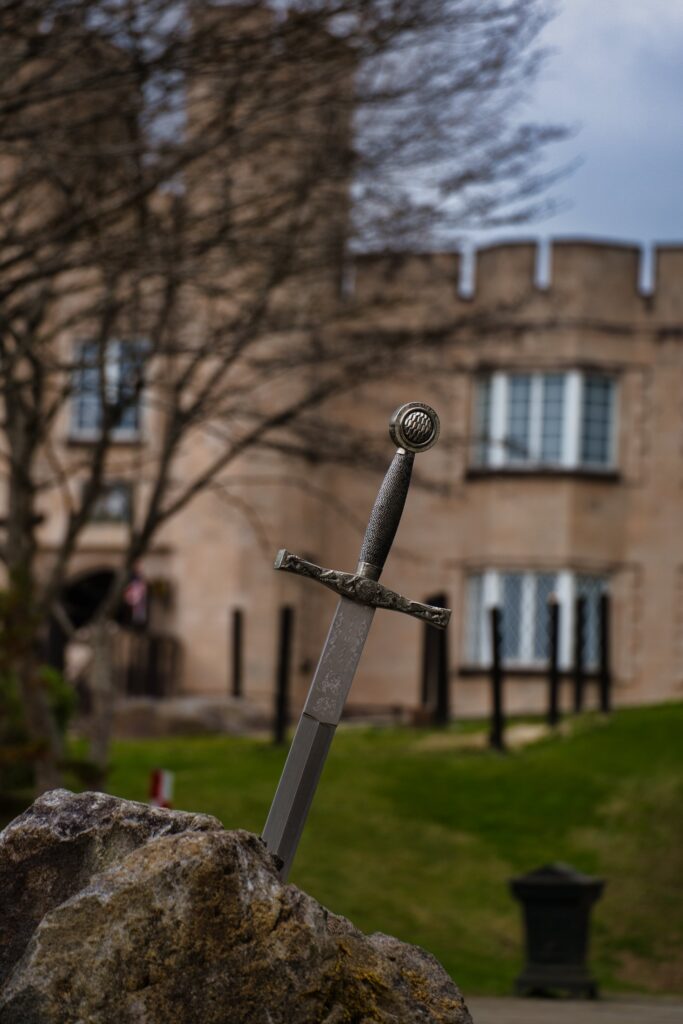Before taking the 300-level English course on King Arthur in Literature and Film, I would have said that Arthurian legend was about a very special sword that had a mind of its own, choosing its very special champion who would lead their land to ultimate victory. I also would have said that the only other major part of Arthurian legend was that the champion’s best friend and romantic partner were in an affair that would break the champion’s heart. What was the main takeaway of this story? That, I would not have been able to articulate, but after this semester, I still don’t have a clear-cut answer…
“Sword in Rock” Photo by Zain Abba from Pexels
It was shocking to begin this course with the impression that the story of King Arthur revolved mostly around navigating betrayal while battling external enemies, because our first reading, Geoffrey of Monmouth’s History of the Kings of Britain, did not hint at anything that I was familiar with. No one ever told me I shouldn’t rely on Disney Channel to give me all the gory details that would prepare me for this course’s content.
To me, the most memorable and hopeful films we viewed were Sir Lanval (2010) and The Sword in the Stone (1963). Other films, I either don’t remember well or will be trying to forget: King Arthur (2004), Excalibur (1981), Lancelot du Lac (1974), and The Mists of Avalon (2001). For different reasons, two movies that were really fun to watch were First Knight (1995) and Perceval le Gallois (1978); the former because the acting and story were interesting and funny at times, and the latter because it was fun to hate on. Monty Python (1975) and Connecticut Yankee (1931) were fun movies, objectively, but they were not to my taste. T.H. White’s Once and Future King and Mark Twain’s Connecticut Yankee fall into the bracket of seeming objectively fun, too, but I didn’t spend enough time with them to greatly appreciate the storytelling.
There’s almost a direct correlation to my ease of getting through Arthurian material and the favoritism I show to each literary or film piece. Chétien de Troyes produced the first telling of Lancelot who had an affair with King Arthur’s queen, Guinevere. This piece of writing, The Knight of the Cart, is highest on my list of favorite writings. Even though I wanted more reasoning behind this love affair, but did not receive any, the fact is that Chrétien supplied what I was looking for in Arthurian legend: romance (Marie de France supplied this as well, with Lanval). This aspect began to feel small when looking at the big picture, though, and this brings me back to the question of why society, throughout millennia, has found Arthurian legend so important.
Somehow, the important themes lied within the pieces that either greatly disturbed me, weirded me out, or simply bored me. Namely, Marion Zimmer Bradley’s Mists of Avalon, Thomas Malory’s Morte D’Arthur, and Chrétien’s The Story of the Grail. Themes of religion/Christianity, war, and much more difficult topics are addressed in these texts. In an effort to grapple with the gruesome or complex nodes of humanity, creators have gone back to the bones of Arthurian legend and built flesh around those bones to suit the world that they knew and possibly wished to see. It is only odd to me that, though King Arthur is supposed to be creating an ideal kingdom—a utopia for his people—it always ends in tragedy, though there lies vague promise of a hopeful future.

“Castle Near Body of Water Under Golden Hour” Photo by Ray Bilcliff from Pexels
This idea that King Arthur is supposed to be creating a utopia is probably most thwarted by selfish undertakings throughout the course of Arthurian literature and film. Without doubt, we can say that leadership is used in the worst way when it is primarily self-concerned instead of primarily others’ focused and about service. Mists of Avalon has become the epitome of this, since the intentions and choices that Viviane makes, specifically, are with no regard to anyone else’s well-being. It’s possible that all of Arthurian legend and the purpose of it revolves around the real battle between selfish ambition and hope for the world.

